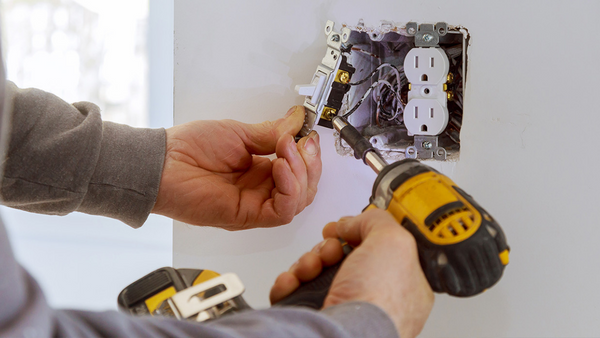
Your future in the electrical field is a bright one. Electricians are essential to our modern way of life, especially when you consider the demand and growing use of electricity. It would be difficult for most of us to get through more than even a few hours without missing the benefits and convenience of electricity. New infrastructure projects, updates in building codes, emerging technologies, and the push for alternative energy sources will mean many job opportunities for licensed professional electricians in the coming years.
Residential electricians are responsible for installing, maintaining, and repairing electrical power, lighting, communications, and control systems. A skilled electrician should be able to read blueprints or diagrams, conduct inspections of equipment and connections, and identify and repair potential problems while adhering to state and local building regulations and codes.
Skilled electricians are needed in California, with the state possessing the highest employment levels for electricians, followed by Texas, Florida, New York, and Ohio., according to the U.S. Bureau of Labor Statistics (BLS). The duration of becoming a residential electrician varies based on the unique requirements of each state or county. Check with your state or county about the necessary licensing and educational hours.
With this information in mind, let’s explore why you should consider breaking into one of the fastest-growing trades in the country. Here are four reasons we believe it’s a great time to start training for a career as a residential electrician:
1. Residential electricians are paid well.
One of the first things people want to know when researching a new career opportunity is what salary potential looks like. Well, in the skilled trades sector, a residential electrician’s salary is one of the highest average salaries in the U.S. The BLS reports that the median salary for electricians is $60,040, with the highest earners taking in more than $99,000 per year. This is over $10,000 more than the average for all construction and trade jobs and roughly $15,000 more than the average for all occupations. In California, the annual mean wage for electricians is $75,870.
Like most industries and career paths, there are different earning levels depending on where you’re at in your career. Licensed master technicians are generally the top earners in the profession. Those starting out in the industry as apprentices will make less than fully trained electricians, but your pay will increase quickly as you learn more and move up. According to Salary.com, the average electrician apprentice salary is currently $52,800.
2. Residential electricians are needed in the workforce.
The BLS estimates that jobs for electrical workers will grow 9% by 2031, with roughly 79,900 job openings projected each year. The biggest reasons for job growth will be increases in construction and the increased demand for alternative energy sources. Infrastructure development also comes with new residential and commercial projects. Older buildings need to be retrofitted for emerging technologies and alternative energy sources.
Many residential electrician jobs will result from the retirement of older electricians or those who transfer to different occupations, but many will also be newly created positions to fulfill demand.
3. Residential electricians have much-needed skills.
By becoming a residential electrician, you are also gaining skills that many rely upon. As you grow in your career, your skills will also increase. Someday, your electrical skills in proper installation, maintenance, and repair will make the environments where people live a safer place.
You could even save lives! According to the National Fire Protection Agency, electrical fires are the leading cause of home fire property damage in the U.S. Electrical failure or malfunctions resulted in an average of 33,900 fires resulting in 470 deaths, 1,100 injuries, and $1.4 billion in property damage each year from 2014-2018. Skilled residential electricians will play a huge role in reducing these statistics and improving the safety of our homes.
4. Residential electricians have a lot of opportunities.
Upon earning your professional electrician license and gaining the experience you need, you may choose to work for an established company as part of an electrical team, or you could open your own company and go into business for yourself. Once you find your niche, you could also choose to become more specialized. For example, you could specialize in installation or maintenance and repair or in a specific area such as solar energy. Each specialization will open up new opportunities to advance your career and gain more complex skills.
To become a residential electrician, you will need to complete a formal training course and likely start out as an apprentice to a professional electrician. In California, for example, you will need 4,800 work experience hours as a trainee/apprentice to become a residential electrician.
You will want to choose a residential electrician course that will teach you general and electrical safety procedures, how to use the materials, tools, and equipment you will encounter on the job, the intricacies of electrical code, and how to read building plans. You also want a program that will begin to prepare you for the licensing exams you will eventually need to take.
If this sounds like the career field for you, SDSU can help you achieve your goal of becoming a residential electrician—online. Explore the SDSU Global Campus Residential Electrician training course today!




